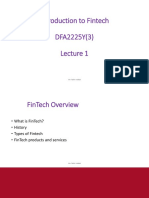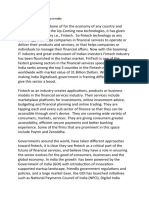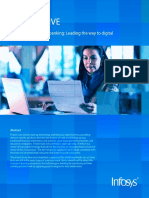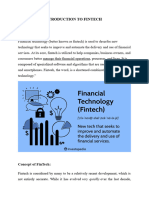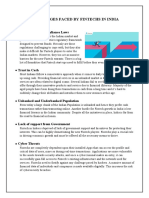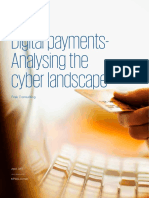100% found this document useful (4 votes)
1K views34 pagesFinTech Overview: Trends and Future
The document provides an overview of FinTech. It begins with defining FinTech as the intersection of financial services and technology where startups innovate on existing financial products and services. Reasons for the growth of FinTech include changing consumer behavior, the shortcomings of traditional banks, and supportive government regulations. The FinTech landscape covers various segments including lending, payments, wealth management, and blockchain. As the sector matures, consolidation is expected along with emerging trends such as the battle for deposits, growth of reg-tech, unbundling of payroll services, and new investment platforms.
Uploaded by
varun022084Copyright
© © All Rights Reserved
We take content rights seriously. If you suspect this is your content, claim it here.
Available Formats
Download as PDF, TXT or read online on Scribd
100% found this document useful (4 votes)
1K views34 pagesFinTech Overview: Trends and Future
The document provides an overview of FinTech. It begins with defining FinTech as the intersection of financial services and technology where startups innovate on existing financial products and services. Reasons for the growth of FinTech include changing consumer behavior, the shortcomings of traditional banks, and supportive government regulations. The FinTech landscape covers various segments including lending, payments, wealth management, and blockchain. As the sector matures, consolidation is expected along with emerging trends such as the battle for deposits, growth of reg-tech, unbundling of payroll services, and new investment platforms.
Uploaded by
varun022084Copyright
© © All Rights Reserved
We take content rights seriously. If you suspect this is your content, claim it here.
Available Formats
Download as PDF, TXT or read online on Scribd
/ 34

